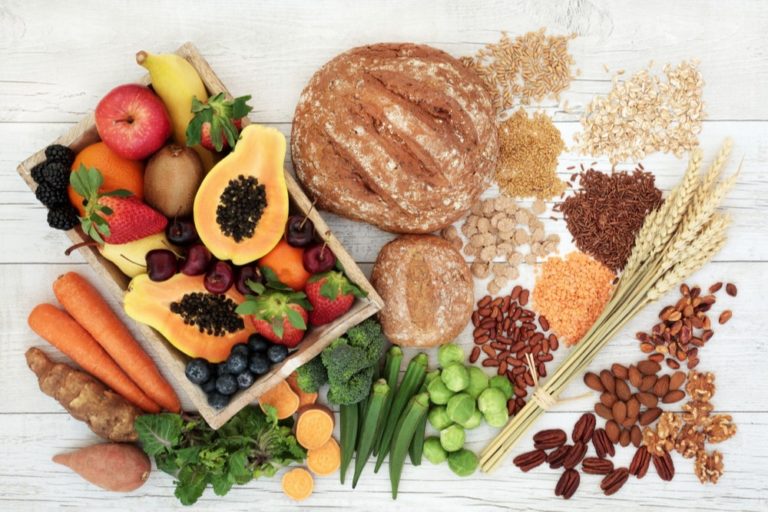We are what we eat. This is true, but if we wanted to get technical about it, we are what we can absorb and utilise. What we mean here is that you can eat the ‘perfect’ diet, but if your digestive health isn’t working efficiently, our ability to use those nutrients from the diet becomes compromised.
We naturally lose some digestive capacity as we age, but there are things we can do to optimise its function. So let’s take a look.
What is Digestion?
Generally, we accept that digestion is the eating and assimilation of food. We use food as fuel, but we also use it to build every single cell in our body. So, breaking it down, and using it is incredibly important to our daily function.
Digestion actually starts in the mind. Before we’ve even taken that first bite, we are thinking about taking it, and our brain tells our digestive system to get to work.
This is why mindful eating is so important, and spending time cooking. As we are preparing food, our senses peak. We smell those spices, and we watch the olive oil drizzle! This process increases saliva production, and in our saliva we find a range of enzymes which help to digest food.
Mechanical Digestion
When we take that first bite, we are mechanically supporting our digestion. Each chew and bite breaks the food into a smaller piece. Now we know asking you to chew each piece of food 50 times is a tall order, but if you are suffering with your digestive health and often find undigested food in your stool, you may find going back to the simple art of chewing more, helps!
Stomach Acid
Once we have chewed that food, it travels down the oesophagus and into the stomach. Here it is submerged in acid. The acidic environment breaks the food down even more, especially protein. It also removes vitamins like B12 from the protein ready to be absorbed.
Whilst we think of the stomach being a vat of acid, and a bit of a tough guy, this is often where things go wrong. If you have too much or too little acid, things can start to go a bit rogue. More often than not, we end up with cases of low stomach acid thanks to a range of medications like stomach acid inhibitors (if you get heartburn), or antihistamines (if you suffer from hay fever). Without enough stomach acid, the food can’t be digested properly. We also experience a natural decline in the amount of stomach acid we produce as we age too.
Nutrient Absorption
From the stomach, the food moves to the small intestine, where most of the nutrients are absorbed into the bloodstream. Here the food is bombarded with digestive enzymes from the pancreas, and bile made by the liver makes its way into the small intestine too. Bile is important for fat digestion and the enzymes secreted by the pancreas help to digest all macronutrients including protein, fat and carbohydrates. It goes without saying, if you have poor liver or pancreas function, your ability to digest food can become compromised. Excessive toxin load can burden the liver, this includes high intake of alcohol but we can also look to environmental exposure too. So limit artificial fragrances in the home, eat organic where budget and access can allow and opt for low-tox cleaning products. We can also opt for whole-foods as opposed to processed foods.
We must also consider that if there is any inflammation in the intestine, this can compromise our ability to absorb nutrients. Diets high in saturated fat and alcohol whilst low in fibre and antioxidants have all been associated with inflammation in the gut.
Waste Excretion
After the small intestine we have the large intestine. The large intestine is responsible for four main things: hydration, microbiome, nutrient absorption and waste compaction. This last function is worth exploring in a little more detail.
At the end of the large intestine, the rectum stores and compacts the waste produced by the body. This waste must be excreted and this relies on sufficient motility through the digestive system. We can improve our motility through eating a fibre rich diet and ensuring that we practise mindful eating by limiting stress around mealtimes.
You see the digestive system can function independently of the brain, meaning that it doesn’t need to be told what to do. What this means is that even if we don’t want it to, it can lose much of its function during times of stress.
Stress and Digestive Function
When we are facing a stressor our body redirects our resources to deal with it. Digestive processes aren’t necessary to our immediate survival in those times, and so blood is redirected away from them. This is why you get butterflies in your stomach, or if you’re feeling particularly stressed, you’ll vomit or have diarrhoea. Without a functioning digestive system, the body just wants the food out.
When the stressor has passed, digestive function needs to resume, so resources are redirected back, hence the commonly known descriptor, rest, and digest.
The issue is that in our modern-day life, stressors don’t seem to pass, or if they do, we soon find ourselves faced with another one.
So, our resources are consistently directed away from digestive function.
Our stress response significantly affects how well we digest and utilise our food. Whilst we can’t remove every single stress from our life, there are some things we can do to mitigate the damage.
Mindful Eating
Mindful eating is about bringing awareness to what you’re eating. When you are focussing on what is in front of you, there isn’t much room for thinking about anything else, for example, those things that are stressing you out.
Mindful eating is a little bit like giving your digestive system the time and space it needs to do its job properly.
And it can be as simple as sitting down at a table with a chair and eating, and not answering emails or taking a work call.
Cooking
We can also spend time cooking – immersing ourselves in the meal we are preparing also distracts us from those things that are stressing us out.
Whilst we may see a natural decline in some of our body’s natural digestive processes as we age, we can take steps to support them. Start by practicing mindful eating. Consider how any medications you are taking may affect your digestive function and speak with a qualified nutrition practitioner on how to support those processes.


